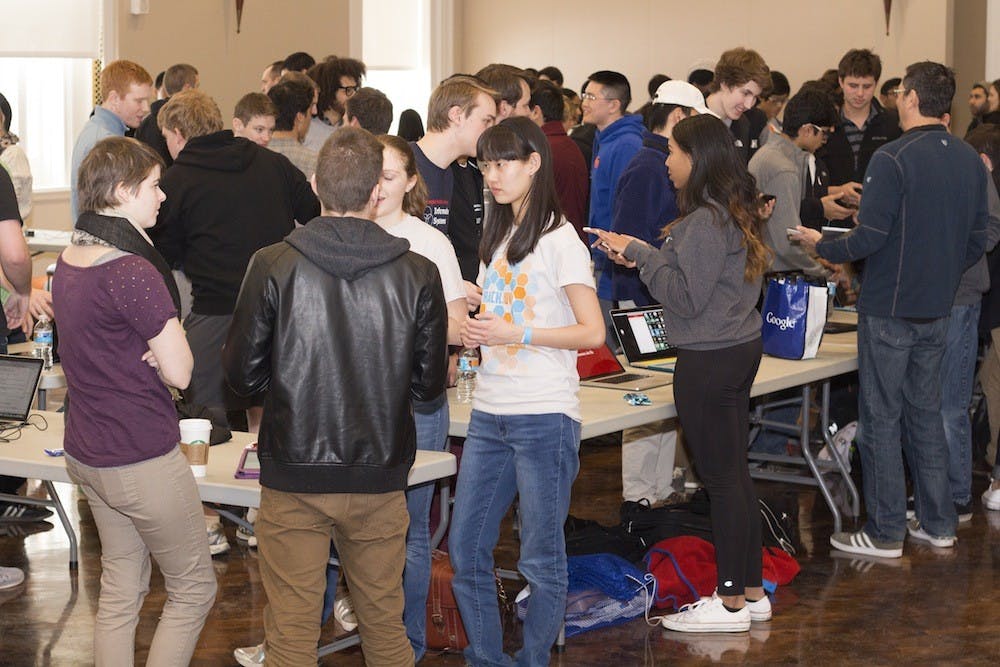The University hosted its second 24-hour Hack.UVA event over the weekend. Held in Newcomb, the event allowed students from the University and other schools in the region to take part in a programming competition, and allowed both graduates and undergraduates to develop and construct web and mobile platforms from scratch.
The hackathon organizers recommended students bring a computer, a phone and their chargers in order to be prepared for the amount of work which would occur overnight. Although the name of the event includes the word “hack” in it, third-year College student Marisa Reddy, one of the event’s organizers, said the competition did not include anyone breaking into any security platforms or websites.
“When we say ‘hack,’ we’re not necessarily saying we’re taking advantage of security flaws — what we’re talking about is using technology in a cool new way,” Reddy said. “So the four most common platforms that you’ll see are games, mobile apps (Android and iOS), web applications and hardware applications.”
Since the contest occurred over a full day, the majority of groups broke up the time in order to take breaks and compose their platforms. Nevertheless, a few students remained awake the entire 24 hours in order to give all their effort to complete their program, and those who experienced the hack-a-thon for the first time enjoyed the atmosphere of the event.
Carnegie Mellon freshman Akshay Goradia said the work at these types of events is freeing and grants a large portion of control to individual programmers.
“I really like hackathons because it’s a chance for you to be in your own bubble and just work on whatever you want with whoever you want,” Goradia said. “There is no external pressure really. You just focus on one thing.”
Among the participants were the students who run and maintain the Course Forum, a website which allows University students to look at comments and summaries of classes. Two such students — fourth-year Engineering student Alex Aberman and second-year Engineering student Atallah Hezbor — said they took part in the contest to update and fix various bugs on the site.
“We did redesign, so there was a lot of bugs,” Hezbor said. “We changed the entire look of the website, so just a lot of touch-ups there.”
The students were provided with meals throughout the night and the morning and were allotted mentors, who assisted them with any bugs or troubles that occurred. Many teams also helped others out with their programs, going table-to-table to look at other projects.
Fourth-year Engineering student Andy Barron said the overall atmosphere was supportive and students were willing to lend one another a hand.
“It’s not competitive — you’d think it’d be competitive, but everyone wants to see what people are doing and help each other out and stuff,” Barron said. “I’ve helped a few people debunk their thing.”
Sean Hambre and Liam Kostan, two Geico representatives who attended the hackathon, said the mentors present make up some of the best resources students have to gain support and knowledge at these events.
“I think the mentor is such a beneficial part,” Kostan said. “It gives the students an extra resource since there’s some things that are easier with having a lot of experience, like knowing which packages to use. Knowing which tool to use is certainly the key to success. With a big lineup like this of all types of skills levels, Capital One has Javascript, and Epic has their own technologies, and Geico has its own technologies — it gives students a lot of opportunities to gain knowledge.”
Both Reddy and Hambre said it is important to welcome students with diverse majors in order for them to bring ideas and gain knowledge about these technologies.
"Meeting people has been great and allows you to meet other people from the community,” Hambre said. “There are students here who aren't computer science, engineering, or [information technology] related majors. There’s so much more than the actual developing. Entrepreneurial skills, business and other things are beneficial for the event."
“Hacking” began at 11:30 a.m. Saturday, and all teams had a deadline of 11:30 a.m. Sunday to submit their programs. Goradia’s team, which created a drunk-texting/location app, called “Someone Join Me,” said they submitted their program one minute before the deadline.
According to Hack.UVA’s website, the judges decided on the top platforms based on “creativity, polish and technical vigor.”
List of Winners:
Best Overall Hack - Automark (Lucas Lin, Zachary Wade, Ellis Tsung, Danial Hussain)
Best Web App - Gimgur (Luke Wolff, Joseph Lombardi, Lev Taylor, Jacob Pomeranz)
Best Mobile App - Boka (Caleb Severn, Daniel Park)
Best Hardware Hack - Lumensonic - (Wen-Ting Zhu, Tien Bui, Carina Cai, Nicole Nguyen)
Best Game App - Platformer (DeMario Hamilton, Tianqi Wang, Lakshay Nayyar)
Best Beginner App - Momentmap (Kristina Covington)







